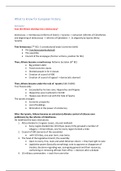Samenvatting
Summary European History: Politics & Culture (840060-B-6)
This Document summarizes the greatest events in time, starting around 7th BC with the first Aristrocacy in Athen, over the Peloponnesian and Punic wars, until the two World Wars. This summery is mainly focusing on the events which happened in Europe, but the American and African colonization is als...
[Meer zien]





